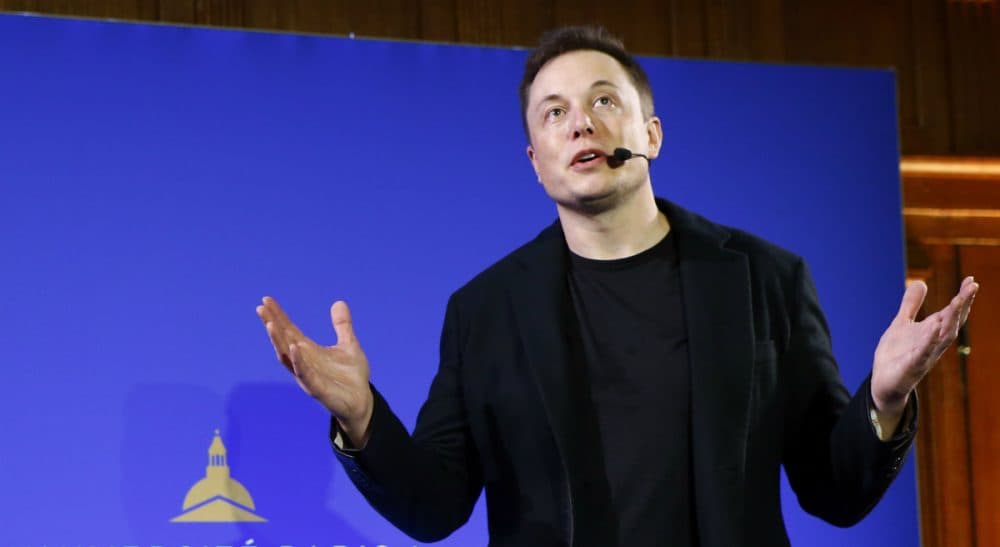Advertisement
Blinded By The Shiny New Thing: When Innovation Is A Double-Edged Sword

Elon Musk’s space exploration company, SpaceX, made history a few days ago when one of its rockets successfully deployed a cargo capsule to the International Space Station, then returned to Earth, making a pinpoint landing on a small platform out at sea. In doing so, the company made critical progress in both being able to reuse rockets, and in enabling future missions farther out into space.
So it was a tad surprising to find that the Washington-based Information Technology and Innovation Foundation recently made Musk (along with other science and technology lightweights like Stephen Hawking) the winner in their slate of nominees for the 2015 Luddite Awards, referring to them as “The Worst of the Year’s Worst Innovation Killers.”
What, in their view, makes Musk a small-minded foe of technological progress? It’s his temerity in voicing concern about the potential dangers of artificial intelligence (AI). According to Robert Atkinson, president of ITIF, society is threatened by “neo-Luddites, [who] have wide-ranging targets, including everything from genetically modified organisms to new Internet apps, artificial intelligence, and even productivity itself. In short, they seek a world that is largely free of risk, innovation, or uncontrolled change.”
the polarization and belligerence that characterizes our public political discourse [is] making its way into scientific debate.
Really?
Never mind that Musk is a major investor in and co-chair of Open AI, a nonprofit research organization whose goal is to “… advance digital intelligence in the way that is most likely to benefit humanity as a whole, unconstrained by a need to generate financial return.” Forget about the fact that Musk’s own Tesla Motors uses AI technology in its experimental self-driving cars.
In fact, Atkinson acknowledges that Musk and Hawking are “pioneers.” But recognizing that there are two sides to the developing AI story — one replete with opportunity, the other with risk — makes Musk an “alarmist” in the eyes of ITIF.
Well tag me an alarmist too — not in regard to artificial intelligence, about which I am almost as ignorant as I am about space travel — but about the polarization and belligerence that characterizes our public political discourse making its way into scientific debate.
This is not a new phenomenon. From the heresy trials of the Inquisition to the creationism cults of today, ideological zeal and financial corporate self-interest have infused most scientific disputes of any significance. Nowhere is that more dangerously apparent than when would-be President Ted Cruz flat-out denies global warming, and the tiny minority of climate change-denying scientists accuse climate change activists of fear-mongering for financial gain. (After all, isn’t it obvious that academics feeding at the trough of grant money live far more lavishly than the hard-working, modestly living gas and oil company executives they persecute?)
In these examples, the disputes have ostensibly been over the facts themselves — the age of the earth, the rotation of the planets, the cause of the rise in average temperature. But they’ve been fueled less by genuine scientific disagreement than by the drive to exercise power on behalf of certain interests such as the dominant church of the time (first Catholic, now Evangelical) or the fossil fuel industry. And if society’s understanding of the facts — of observable phenomena — can be so skewed by commercial and institutional influences, our thoughtful consideration of what actions we should take based on scientific knowledge is even more vulnerable.
Sixty years ago, when the first nuclear power plants came on line, the scientific community agreed on how nuclear fission worked. The debate then (and to a lesser extent, still) was over how they should apply that knowledge, about whether nuclear power was safe and inexpensive enough to be a viable long-term solution. Now we can say with greater certainty that the answer to both is no. But thanks to the concerns and convictions of some in the scientific community, research around renewable energy alternatives to nuclear power and fossil fuel continued even as nuclear power plants were being built. Caution and some healthy skepticism didn’t stifle innovation; it propagated it.
But now, 383 years after Galileo was sentenced to life imprisonment for asserting that the planets in our solar system revolve around the sun, I fear that we are once again entering an era in which anything short of total, unquestioning embrace of a position -- any position — is too nuanced to be tolerated. And once again, this trend isn’t driven by dogmatism alone, but by political and financial interests hiding behind the banner of “innovation.”
Innovation may be important, but never for its own sake, and never at the expense of examining our societal values and collective conscience.
Anti-Luddite crusader Robert Atkinson defines innovation in terms that sound eerily like political campaign promises and corporate annual reports — as developments that increase household income and boost productivity. He worries that questions about the risks of AI will undermine public and private investment in this technology, and his scorn isn’t limited to those who consider its dangers as well as its constructive uses. He also objects to those who question the safety of genetically modified organisms (GMOs) in food, or argue that RFID chips in credit cards or video cameras at red lights pose privacy concerns, or express moral qualms about offensive autonomous weapons — also known as “killer robots.”
Whether Atkinson and others in his camp are honest scientists or purely self-serving corporate interests (or perhaps both), they do us all a disservice by trying to shut down discussion about the potential consequences of these technologies. Innovation may be important, but never for its own sake, and never at the expense of examining our societal values and collective conscience.
